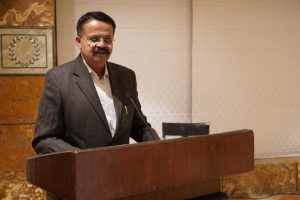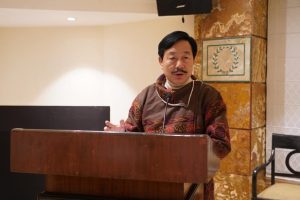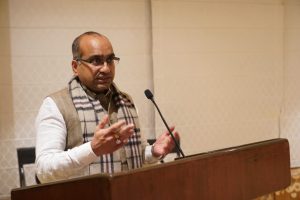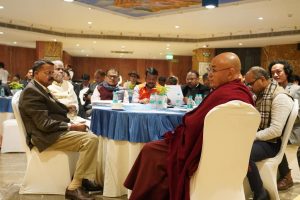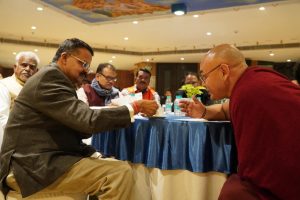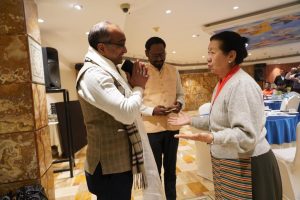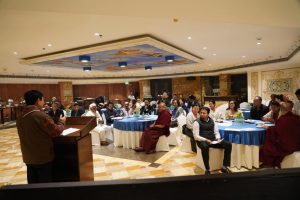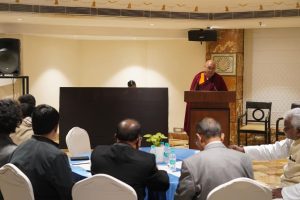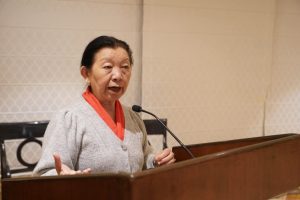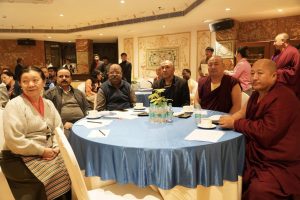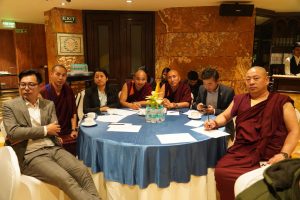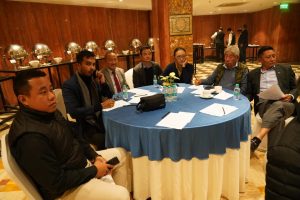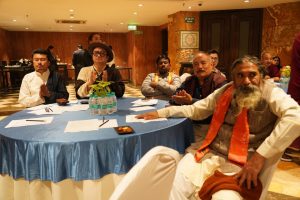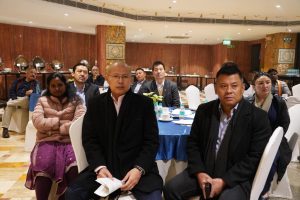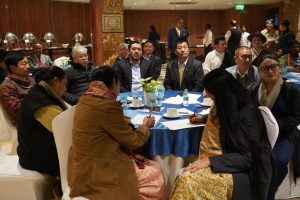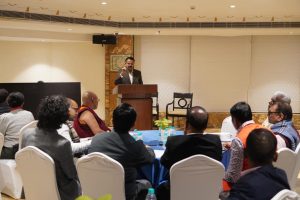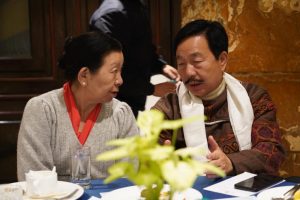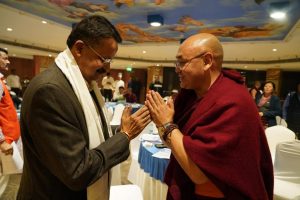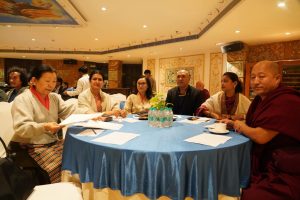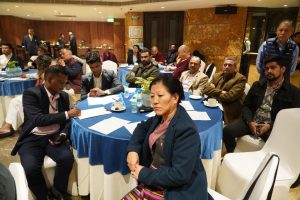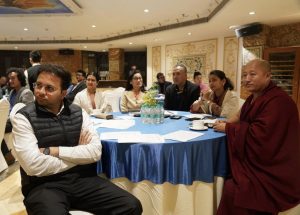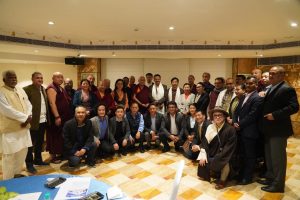
New Delhi, 17th December 2024: The All Party Indian Parliamentary Forum for Tibet (APIPFT) and the Tibetan Parliament-in-Exile (TPiE) convened a meeting on 17th December 2024 to discuss key issues concerning Tibet.
The event began with a welcome address by Shri Tapir Gao, Member of Parliament and Co-convener of the APIPFT. This was followed by a briefing on the latest developments in Tibet by Dolma Tsering Tekhang, Deputy Speaker of the Tibetan Parliament-in-Exile. Additional addresses were delivered by Speaker Khenpo Sonam Tenphel, Shri Sujeet Kumar, Rajya Sabha member and former Convener of APIPFT, and Shri Bhartruhari Mahtab, Lok Sabha member and Convener of the APIPFT.
Several other Members of Parliament also spoke during the event, highlighting various aspects of the Tibet issue. The meeting concluded with the adoption of a resolution on Tibet by the All Party Indian Parliamentary Forum for Tibet.
Over 25 Members of Parliament from various political parties and both Houses of Parliament were present at the meeting including MP Bhartruhari Mahtab, Convener of the APIPFT, MP Tapir Gao, Co-convener of the APIPFT, MP Sujeet Kumar, MP Indra Hang Subba (SKM), MP Krishna Prasad Tenneti (TDP), MP Alfred Kanngam Arthur (INC), MP Dr. Kadiyam Kavya (INC), MP Saleng A Sangma (INC), MP Mahesh Kashyap (BJP), MP Pratap Chandra Sarangi (BJP), MP Adv. Gowaal Padavi (INC), MP Dr. A. Bimol Akoijam (INC), MP Sudhakar Singh (Rashtriya Janta Dal); MP June Maliah (All India Trinamool Congress), MP Harish Chandra Meena (INC), MP Amarsing Tisso (BJP), MP Kriti Devi D. Burman (BJP), MP Sangeeta Kumari Singh Deo (BJP), MP Manoj Tigga (BJP); MP Kamknya Prasad Tasa (BJP), MP Angomcha Bimol Akoijam (INC), MP Praniti Shinde (INC), MP Prabha Mallikarjun (INC), MP Bhoj Raj Nag (BJP), MP Rudra Narayan Pany (BJP), and others.
Shri Tapir Gao, the Co-convener of the All Party Indian Parliamentary Forum for Tibet, in his address welcomed reiterated his statement in the Indian Parliament during the Zero Hour urging the Indian government to recognize the institution of His Holiness the Dalai Lama and to confer him the Bharat Ratna. He also emphasized the importance of India preparing for the reincarnation and succession of His Holiness the Dalai Lama, especially in light of China’s attempts to appoint its own 15th Dalai Lama, as stated today in the Indian Parliament.
Deputy Speaker Dolma Tsering Teykhang briefed on the latest developments in Tibet, highlighting the Chinese government’s coercion of Tibetan children into colonial boarding schools in Tibet, aimed at depriving them of their birthright to learn their language, culture, and religion. She also addressed the self-immolation protests by Tibetans in response to China’s human rights abuses, as well as the strategic policies implemented in China’s ongoing Sinicization efforts in Tibet, among other issues.
Shri Sujeet Kumar, Rajya Sabha member and former Convener of the APIPT, in his address, recalled his past association with the BJD, which was founded by Shri Biju Patnaik. He highlighted that Shri Patnaik, a staunch supporter of Tibet, was one of India’s foremost Chief Ministers, known for providing land for Tibetan settlement in the state of Odisha. Shri Sujeet Kumar expressed pride in his long-standing connection with Tibet and emphasized that India has never shared a border with China, but with Tibet, a fact supported by the historical name of the Indo-Tibetan Border Police (ITBP). He concluded assuring his steadfast support to the cause of Tibet.
In a heartfelt speech at the All-Party Indian Parliamentary Forum for Tibet (APIPFT), Speaker Khenpo Sonam Tenphel highlighted the Forum’s crucial role in uniting Indian political leaders in support of Tibet and its cause. He expressed deep gratitude for India’s ongoing solidarity with Tibet, especially recognizing the efforts of leaders like Shri Bhartruhari Mahtab and Shri Tapir Gao, who advocated for Tibet in the Indian Parliament. The speaker underscored Tibet’s vital geopolitical and cultural ties with India, emphasizing Tibet’s historical role as a buffer state and its environmental significance.
Shri Bhartruhari Mahtab, the Convener of the APIPFT, emphasized the strong friendship between India and Tibet, underscoring Tibet’s rich culture, religion, and language, which are under threat of destruction due to Chinese occupation. The Convener also reiterated the historical fact that India shares a border with Tibet, not China, asserting that the Line of Actual Control rightfully represents the Indo-Tibet Border.
During the meeting, several key agendas were discussed. One of the main topics was how to enhance outreach to various political parties on Tibet-related issues, including efforts to encourage members of the All Party Indian Parliamentary Forum for Tibet (APIPFT) to raise Tibet’s concerns in the Indian Parliament. Another important item was the planning of programs for the 90th birthday year (Compassion Year) of His Holiness the 14th Dalai Lama, with the intention of organizing events in collaboration with the Tibetan Parliament-in-Exile (TPiE) to promote the values of compassion.
The event concluded with vote of thanks by Tashi Dekyi, Coordinator, India Tibet Coordination Office, New Delhi.
The following 12 points were adopted at the meeting.
- Enhance reach out to different political parties.
- Raise Tibet issues in the Indian Parliament by the members of All Party Indian Parliamentary Forum for Tibet (APIPFT).
- Programs to be organised during the 90th birthday of His Holiness the 14th Dalai Lama (Compassion Year), in collaboration with the Tibetan Parliament-in-Exile (TPiE).
- Recognize Tibet as an occupied nation with its own independent and sovereign past, backed by historical evidence.
- Urge the People’s Republic of China to engage in substantive dialogue with representatives of His Holiness the Dalai Lama, or democratically elected leaders of the Tibetan community without preconditions, aiming to resolve the Tibet-China conflict through the Middle Way Policy and seek genuine autonomy within the PRC’s constitution.
- Climate Change Research: Call upon the United Nations Framework Convention on Climate Change (UNFCCC) to initiate scientific studies on the PRC’s exploitation of Tibet’s natural resources and its adverse effects on global climate change.
- Human Rights Monitoring: Pressure China to grant independent human rights organizations access to monitor and report on the human rights situation in Tibet. Additionally, extend standing invitations to UN Special Rapporteurs, especially those focusing on freedoms of opinion and expression, peaceful assembly and association, and human rights defenders, to facilitate their visits to Tibet as soon as possible.
- Release of Tibetan Political Prisoners: Urge the PRC government to unconditionally release all Tibetan political prisoners, including Gedhun Choekyi Nyima, the 11th Panchen Lama, whose whereabouts and well-being have been unknown since May 17, 1995.
- Halt Oppressive Policies: Call on the PRC to cease its oppressive policies aimed at eradicating Tibetan culture, language, and religion.
- Legislative Framework Against Authoritarianism and Disinformation: Establish a national legislative framework to combat China’s networked authoritarianism and disinformation campaigns, which erode public trust in democratic institutions, increase political polarization, and threaten regional and global stability.
- To urge the legislators to express their concern and raise their voice over the human rights violations in Tibet at all the available platforms.
- Any other matter with the permission of Chair.
